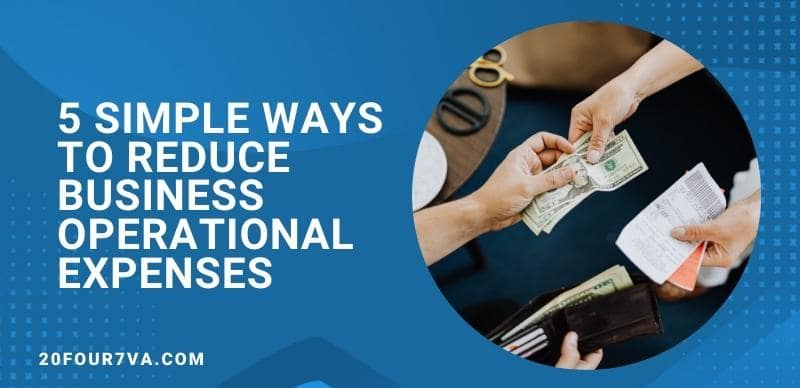5 Simple Ways to Reduce Business Operational Expenses
Do you know the top business expenses that are often overlooked by small business owners? These costs can be reduced or eliminated if they are identified and addressed.
Keeping profits high and business expenses low is essential for the survival and growth of any company. Many business owners prefer to overdo it on promotions and marketing to close more sales and gain more customers, so reducing expenses is often relegated to the back burner.
This is understandable since business expense deductions don’t sound as exciting as crafting online marketing tactics that increase revenue and brand awareness. Besides, reducing business expenses is often equated to cutting back, which people don’t always associate with growth.
However, to keep your cash flow in check, you need to find ways to manage your operational costs more effectively. Otherwise, new customers and increased sales would only lead to your business breaking even instead of turning a profit.

WHAT ARE OPERATIONAL BUSINESS EXPENSES AND HOW CAN YOU REDUCE THEM?
Perhaps one of the reasons entrepreneurs don’t focus on lowering operational costs is that it usually means making huge sacrifices. Does this mean settling for a substandard brand when buying new equipment? Will you have to put in more hours and take on multiple responsibilities instead of hiring new people?
The good news is that reducing operational costs doesn’t mean holding your brand back, at least not when you learn about deductible business expenses. To do that, you must first have a clear understanding of what your personal and business expenses are.
Business expenses refer to any costs you incur to keep your company running. This is different from capital expenses, which are one-time, big purchases.
Depending on the nature of the company, these are the most common operational costs of a business:
- Office supplies
- Marketing expenses
- Payroll
- Insurance premiums
- Utility fees
- Business travel expenses
- Legal fees
- Depreciation
- Royalties
- Advertising
- Bank fees
Reduce business operating costs with these 5 simple steps:
1. BE ENERGY-EFFICIENT
Utility fees eat up a large chunk of your monthly income, especially if you keep appliances turned on even when not in use. Make sure to turn off appliances or power down your main switch during closing hours. Of course, being conscious of energy consumption requires an entire team to work. Make it a company rule to switch off computers, lights, and other machinery at the end of the day.
Being efficient also means investing in appliances that consume less energy but still get the job done. For instance, compact fluorescent bulbs can give you better lighting for less power consumption. While some energy-efficient appliances may cost more, they can prove to be more economical in the long run when you factor in cheaper utility bills and even green energy tax rebates.
2. GROW YOUR TEAM WITH VIRTUAL ASSISTANTS
Learning about deductible business expenses isn’t the same as holding back — and no better example illustrates this fact than working with a virtual assistant (VA) instead of in-house employees. For one thing, this means outsourcing specialized work such as marketing, accounting, and design to experts instead of having on-site staff without proper training take it on.
Additionally, several studies support that remote work leads to higher productivity and is preferred by millennial workers, who now make up the bulk of the labor force. Besides, think about the responsibilities you’ll be relieved from if you hire a virtual assistant. You’ll spend less on office expenses, have no unexpected variable expenses, and generally have lower operational fees because VAs are self-employed individuals. These types of workers use their own tools and pay for their own utilities.
Even better, when you partner with staffing companies instead of directly hiring a remote office assistant, you save money and won’t have to take care of payroll, training, and employee benefit programs — some of the most common operational costs that can rack up thousands of dollars.
3. SWITCH TO A CLOUD-BASED PHONE
Although cloud-based phone technology is geared towards 100% virtual businesses, even brands with physical establishments should consider it. Have a look at your phone plan and consider your usage. Is your monthly bill really worth the number of times you use your landline?
With social media and email channels available, most consumers prefer to get in touch with brands online instead of going through the motions of picking up a phone, dialing a number, and waiting to be assisted. Aside from the fact that many people are more comfortable airing out their concerns online, it’s also costlier for consumers to call.
Cloud-based phones are subscription-based phone services you can purchase online. As far as cost savings and usage optimization are concerned, they outrank traditional phone systems and should be prioritized as a legitimate business expense.
Here are 8 popular cloud-phone systems you might want to try:
- Vonage for Business
- Dialpad
- ShoreTel Sky
- Mitel
- Jive
- 8×8
- OnSip
- RingCentral
4. TRAVEL FOR BUSINESS ECONOMICALLY
Business travel is inevitable. As a business owner, you need to attend conferences or seminars to expand your network and industry skills. You might also need to meet with a business coach or partner to help you become a more strategic manager and entrepreneur.
If you’re gearing up to expand your brand, business-related activities such as traveling to meet with and pitch to investors also takes an important place in your agenda. Apart from these, when you delegate tasks that require employees to travel, you are also expected to reimburse the business trip expenses they incur along the way.
Thankfully, while business trips may be unavoidable, it is also controllable. The following techniques will help you be more strategic and economical on these kinds of business-related expenses:
- Use business credit cards that reward frequent travelers. When used strategically, credit cards can help you make the most of your small business expenses. Many banks offer credit cards that reward users who accumulate points from online shopping and traveling. Take advantage of these rewards by booking airfare and hotel accommodations with credit cards. Rewards can come in cash, room or flight upgrades, and even free airfare – great things you can use to deduct travel expenses.
- Outline refundable items from the get-go. To discourage overspending, make sure your employees know what you can reimburse. Fare, room accommodations, and food are essentials. However, Business.com revealed that some employees also spend and expect refunds on less significant items, such as health club visits, room service, minibars, and other personal expenses.
- Use AI for auditing expenses. Manual accounting is more tedious and prone to errors. That’s why it is wiser to ditch manual accounting and switch to AI or online tools when it comes to auditing your travel expenses. Apart from this, using technology for checking personal and business expenses also gives you a chance to catch unnecessary spending. AI systems have the power to cross-reference online platforms to verify the source and the validity of expenses incurred.
- Take time for self-education. While having an industry coach has advantages, it’s not the only way to learn how to increase business growth. There is a myriad of books and online webinars especially dedicated to small business owners. Listening to podcasts or TedTalks for business while running errands will also help you gain industry and leadership insights without having to spend on fare or conference tickets.
5. AVOID LATE PAYMENTS TO AVOID CASH FLOW PROBLEMS
In a nutshell, cash flow refers to the movement of money in and out of business. Problems with cash flow happen when you get late or incomplete payments but still need to shell out money to keep your business running.
To ensure that your business cash flow runs smoothly, lessen the tendency or possibility of late payments from customers. Here’s what you can do:
- Get paid upfront. Make it a priority to collect payment upfront for your service. If this isn’t possible for some clients, ask for a 50% non-refundable deposit to create a cash buffer.
- Offer different payment options. Are you only collecting cash payments? Make your services available to more customers by offering multiple payment options through credit or debit cards, bank transfers, and other online payment portals.
- Reward full, on-time payments and penalize late ones. Encourage your customers to pay in full and on time by providing incentives such as rewards points or discounts for future purchases. Another way to do it is by charging delinquent customers with late fees on top of service costs.
- Send bills as soon as possible. If your line of business doesn’t have fixed service rates, it’s important to send out invoices as soon as you settle the service terms and fees with a client. If your company offers fixed rates for products or services, you can help customers pay on time by sending automated payment reminders. Tools like WaveApp, Kashflow, and Invoicely can help you automate invoice reminders. You can also set this up from Outlook or Gmail.

How Do I Categorize Expenses for My Small Business?
Business expenses are either business category or business purpose. They can be classified as a business category if they have a broad nature, i.e., they affect the business operation as a whole, whereas business purpose refers to how you deduct expenses related to running your business.
To manage business expenditure easier, list every item from the purchase order number down to the purpose. The biggest misconception about business accounts is that they are beyond the scope of personal accounting. They’re not; instead, they’re just another way to keep track of your money. There can be different reasons you might need business expenses, but it’s necessary to list them separately by purpose, such as office supplies, utilities, operating costs, and business events.
Can a business expense be tax deductible?
The objective of business expenses deduction is to ensure that business owners know how they can save more money. If business costs are too vague, there’s a higher possibility of not deducting business-related expenditures as a tax-deductible business expense.
A business expense can be deductible if it satisfies the three tax-deductible criteria:
- Must have a business purpose
- Not for personal use
- In most situations, a business expenditure is designated as a deduction by default
Business expenses are crucial not just to business owners but also to their employees. In this sense, business expenses deduction is a complicated business. There’s a risk that business owners may make an error in their company expenses deduction, or that minor expenditures might go unnoticed.
If an expense has gone past the business purpose and partial or fully tax-deductible criteria, it cannot be deducted from business income taxes. If you notice this, contact your accountant immediately to avoid any penalties that may arise.

What are deductible business expenses?
It’s now time to learn about business tax deductions after you’ve determined the company category and purpose. The term “business expenses deduction” refers to the pre-tax income allowance before taxes are calculated. This implies even more tax advantages and savings!
The following are some business expenses you can deduct:
- Business equipment expenses — Computers, laptops, printers
- Business vehicle expenses — Business automobiles and trucks
- Office supplies expenses — Stationery items for business use such as pens and paper
- Home office expenses — The home office deduction applies to a home used as a workplace regularly for business. This does not apply to a living room workspace that is utilized only on occasion.
- Business travel costs — Airfare, hotel reservations, meals, and client gifts
- Internet & phone expenses — Deduct online fees such as business email subscriptions and business phone service contracts
- Advertising expenses — Promotional materials used to promote business products or services
What are considered personal expenses?
Personal business costs are not deductible expenses. It is improper for a business to take deductions for operational expenditures while generating personal profits or preferences. Some expenses used for personal purposes that business owners should never deduct as business taxes include:
- Travel costs for private reasons — Personal trips unrelated to business, such as family vacations and personal business trips not essential for business activities
- Meals or entertainment with non-business partners — Meals are deductible provided the business is the dominant participant. For instance, business partners that do business at night and then eat together afterward will remain business-related.
- Business gifts — Only business-related expenses can be deductible. The same guideline applies to business entertainment expenses, such as buying tickets for the theater and sporting events. If the beneficiary is not a business partner, it cannot be deducted from business taxes.
Small Business Expenses and the Internal Revenue Service
The Internal Revenue Service or IRS imposes business taxes for business expenses deduction. The business’s tax form is determined by its business operations. For example, business entities such as sole proprietorships and partnerships (called pass-through businesses) use Form 1040 Schedule C, C-EZ, or F.
Corporations file self-employment income with Form 1120 or 1120S. The business owner’s personal tax return is filed with the business’s taxation form; then, business taxes are paid by filing business profits.
Business expenses deduction can be a challenging process for business owners and their accountants alike. It is imperative to keep track of business expenditures or risk not deducting business expenses from income tax. To avoid business expenses penalties, the business owner should be constantly aware of business tax rates and business deductibles.
For the business owner, the best place to start is learning about business deductions. For accountants, it’s crucial to know what business expenses are deductible so as not to trigger IRS audits for their clients. It would be much easier for business owners and accountants to just claim business expenses as a deduction to lessen business tax rates.

What are some tax deductions for business expenses?
A business expense is a deductible business expenditure or loss for a company owner. When business owners file their tax returns, this deduction is subtracted from gross income to determine taxable revenue. Although they have the same name, business deductions are distinct from company expenses.
Business deductions are linked to taxable income, whereas business expenses are non-business company costs that aren’t directly connected with taxable income.
Business deductions and business expenditures for tax purposes should be kept separate since business expenses do not always provide tax benefit possibilities, but business deductions may be used to offset some or all of the cost of running a company.
-
Interest Expenses
Is the business savings account interest rate high enough for business owners to invest company funds? If you answered no, business owners might want to look around for business savings financial accounts with lower rates. In order to avoid paying unnecessary business interest expenses, they’ll need a business savings account.
-
Internet Providers
Online business marketing requires an internet connection from reliable service providers.
-
Dues
Is the business membership fee reasonable for business owners? Businesses that are members of trade associations or business organizations may save money on items and services from the industry.
-
Insurance Costs
Businesses need to find out about business liability insurance costs. Businesses need insurance to protect assets and income from risks such as lawsuits or loss of property.
-
Telecommunication Costs
Is there a mobile phone plan that will not cost business owners much? If business owners are not careful with their business phone plan, they may be spending too much money on business calls.
-
Advertising Costs
Are digital marketing campaigns getting the visibility and leads they need? Does advertising work, or is it just a waste of money? Business owners should not rush to come up with an answer because advertising works differently for different businesses.
-
Rent
Business owners should not forget rental costs. If business owners rent property, they need to make sure the rent expense is reasonable for budgeting purposes. Business expenses may be deducted from company profits when the premises are used for both business and personal purposes.
-
Meeting Venue Costs
Are meeting venues too expensive for business owners? If business owners think about meetings, conventions, or conferences, expenses related to meeting venue costs should be considered.
-
Car Expenses
Do business owners need to use their cars to make business deliveries or pick up supplies? Business car expenses can be deducted from company revenue tax. If the vehicle is used for more than 50% of business activities, it may be eligible for a partial or full business-use deduction.
-
Audit Expenses
Business accounting is a corporate function, and business owners can deduct business audit costs from their income if their accounting procedures are appropriate and required for company operations.
NEXT: 15+ Questions You Should Ask About Outsourcing (with Answers)

Other Business Expense Tips
To claim business expenditures as business costs and get the most out of their company tax deductions, small business owners must understand IRS expense deduction rules. Only expenses incurred in connection with a company’s business activities or trade, or business should be claimed as company deductions.
If you want to understand more about business expense deduction, seek assistance from a professional tax accountant who can assist you in determining legitimate business expenditures that may be deducted from company taxes. You may also want to ask a business advisor or consultant for guidance on business expense claims.
READY TO LEVERAGE THE POWER OF VIRTUAL ASSISTANTS AND CUT YOUR OPERATIONAL EXPENSES BY AS MUCH AS 80%?











